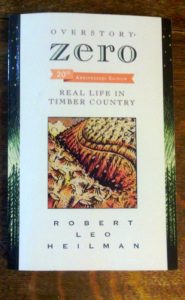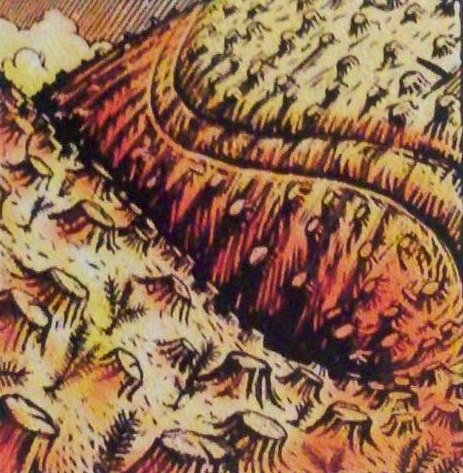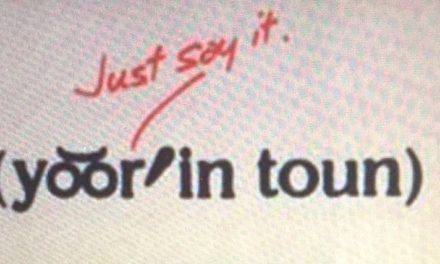The Book
Title: Overstory: Zero (Real Life in Timber Country)
Author: Robert Leo Heilman
Publication: 20th Anniversary Edition published by Sylph Maid Books; 1st edition, 1995; second edition, 2014
Awards: Winner, Andres Berger Award for Nonfiction by Northwest Writers Inc., 1996; Nominee for literary arts Oregon Book Award, 1996; The Oregonian Book Club selection, December 1998
By Daniel Buckwalter
I remember well an evening at the dining room table at the family house west of Roseburg. It was spring. I recall that because, though it was dinner time, there still was dewy light during that damp season in the Umpqua Valley.
For the life of me I can’t remember what the conversation was about, or what prompted the pent-up question, or my father’s detailed response. All I know is that I was seventeen, I clanked my fork on the plate, and I looked at my dad, a man then in his fifties, who had made a complicated migration from South Carolina to Oregon.
“You were born in April, 1928?” I asked.
He nodded. “Yes.”
“And the Great Depression started in 1928?”
“Yes,” he replied.
“How did Grandma and Grandpa handle that?”
Now it was his turn to clank his fork on his plate. He smiled. “They were resourceful,” he said.
My father went on to explain the centered jobs, the odd jobs, and the creative bartering that went on in his childhood during the Depression.

Overstory: Zero (Life in Timber Country), by Robert Leo Heilman
I remembered it again in Robert Leo Heilman’s collection of essays, “Overstory: Zero: Real Life in Timber Country.” It’s the 20th Anniversary Edition of the award-winning book, with ten new essays added from the 1990s. But don’t be dissuaded by the age of the essays. Not only does the writing hold up, but all the essays can easily be templates for our present, fast-moving and automated culture.
Heilman resides in Myrtle Creek, a tiny, now graying hamlet in south Douglas County where he has lived most of his adult life, and an area of Oregon I used to know well. I left it as quickly as I could, not unlike my father leaving the deep South in his time, convinced there was a center of the world elsewhere.
Heilman writes about the good people in his community — and they are good people — with sparse compassion. His politics and social outlook differ from the majority of the region, yes, but he never looks down on his neighbors because everyone he writes about, including himself, is in the same recessionary boat of the 1980s, navigating choppy waters not of their own making to cultural ports that are unknown.
And it brought out in me the same questions that have burned since my teenage years: How do you define resourceful? Who sets the parameters? Should we all stand still and accept that the center of the world is where we stand?
In “Getting By” — one of the ten new essays added for the anniversary edition — Heilman probes these questions. He writes of the algebra that became the recession of the 1980s, and where, throughout the timber regions of Oregon, men and women with generational roots were forced to confront the possibility of abandoning their culture, their identity, for an environmental gospel that had the spotted owl as its crown, an animal most had never seen.
Some moved to other states for lower-paying, but steadier, jobs. Others were not so fortunate. Families broke up, divorces were finalized. “Three of my friends, all men, died violently,” Heilman writes.
Even Heilman was not immune from the encroaching storm: Poor people break laws as a matter of survival; corporations break laws as a matter of business acumen. Like most of my neighbors (and all of my friends), he writes, I lived as the pettiest sort of criminal — driving without car insurance; selling raw, uninspected milk and not reporting the income; accepting food stamps without authorization; cutting firewood without permission; eating poached salmon and venison.
That primal rawness is an exhausting way to live, yet Heilman, his wife and son survived. But again, why? Was it because of individual and familial strengths? “It would be a comforting notion, if I could only believe it,” he writes. “But I’m convinced that it was only the result of a statistical fluke.”
For those who stayed in south Douglas County, and in all timber communities in Oregon, the cultural changes they accepted were subtle and surprising. In “Talking Trash” — another of the new essays from the 1990s — Heilman writes about a neighbor, a logger, whom he sees at the dump (now called a “transfer site”).
The neighbor pulls up in his pickup and its prominent bumper sticker: “Help Ruin America — Join an Environmental Group” and immediately “dropped off his newspaper, glass, tin cans and plastic milk jugs in their appointed bins. It was all so commonplace that, if it hadn’t been for that bumper-sticker, I never would have noticed,” he writes.
Heilman is delighted, almost smug until he realizes that the “new” transfer site, complete with its recycling bins, is more than a decade old. “Where the hell had I been all that time? How could I have not noticed that my neighbors had accepted this once radical change, endorsed it whole-heartedly as an act of common decency?”
Heilman speaks of the political divide of the 1980s and ’90s in what is a foreshadowing of the current climate. Before the Internet, people gathered more regularly, and at the end of “Talking Trash” there is the story he writes about his staffing of an informational booth at a crafts show at the county fairgrounds.
The spotted owl controversy is raging, neighbors were upset at the prospect of losing jobs, homes and a way of life. Opponents of this are labeled as “them” — or worse — and complaints and accusations started to fly. “… you’d think there was a war on and that unconditional surrender was the only way to end it.
“Well, there’s no use arguing with people when they’re upset. We just let them blow off steam until they settled down. Then we asked them all the same question, Forget about ‘them’ for a minute, what do you want?”
The people were stunned. Perhaps they had never been asked that before. “In the end, they’d let loose with a what-the-hell sigh, take a look around and lower their voices, ‘Well, it’s pretty simple really …’ ”
It is, too. People just want to stand still, and accept that where they stand is the center of their world. The parameters, the social boundaries, will alter — always — but the resourceful among us, however that is defined, always adjust and circle back to our roots.
Robert Leo Heilman does a wonderful job of reminding us that the journey of the people of Myrtle Creek is the journey of all of us.












